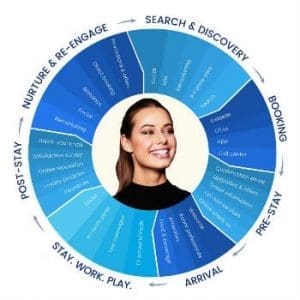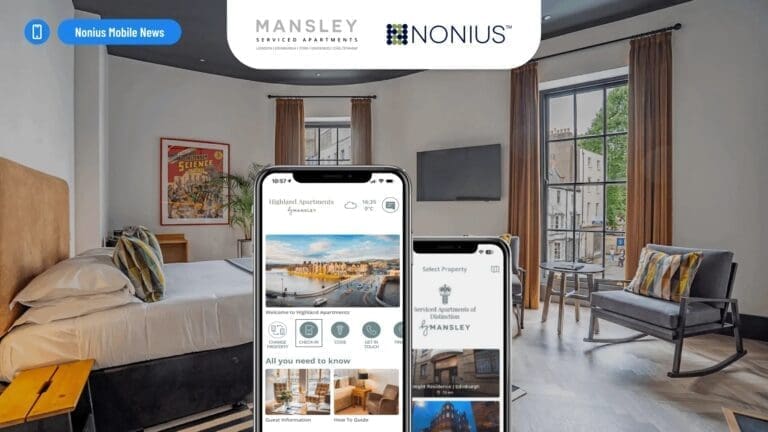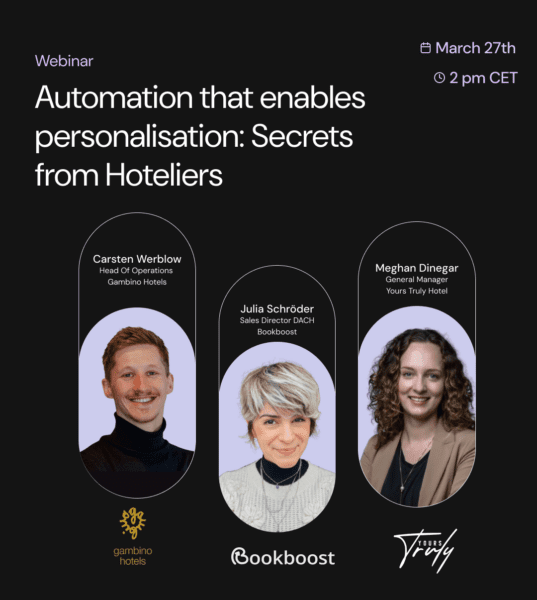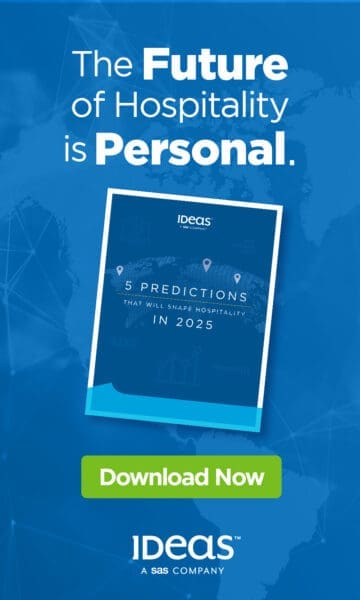 Through the guest journey, travelers interact with a myriad of different systems, but historically, those systems would not talk to each other. Each system would hold a sliver of information about each customer, but they would not be stitched together in any meaningful way. If hotel marketers want to truly unlock the power of data, that needs to change.
Through the guest journey, travelers interact with a myriad of different systems, but historically, those systems would not talk to each other. Each system would hold a sliver of information about each customer, but they would not be stitched together in any meaningful way. If hotel marketers want to truly unlock the power of data, that needs to change.
Search and discovery
A potential guest, when making a purchasing decision about booking travel, can have hundreds of touchpoints across multiple websites, social media platforms and digital channels. In addition to a hotel’s website, prospective guests use a hotel’s social media video and imagery to get a deeper sense of what it would be like to experience a location, and they use the interpersonal aspect of social media to get feedback from others who’ve been there. Personalization can take the form of targeted social media ads and enticing offers to when they log on to a hotel’s website. Loyalty members should be recognized and rewarded. Potential guests should be courted to join and book direct for savings and/or perks.
In the search stage, hotels need to focus on awareness, consideration and intent when building out their digital strategy. There are some clever ways to maximize return on investment, such as using remarketing to customers who already know about your hotel instead of attempting to compete for high-cost keywords. Use your hotel’s own guest reviews and surveys to find long-tail keywords that crop up often, such as family-friendly or luxurious. And make sure to place smart bids on searches made by consumers that show strong intent to buy. Your hotel should be the top result when a potential guest is searching for you directly. Start promoting the benefits of your loyalty program in the Search and Discovery phase, offering perks as part of your “book direct” strategy.
Booking
Once they’ve decided to book, they interact with an online central reservation system, or contact a call center and speak with a booking agent directly. Personalization is key there, as well. When pulling up a potential guest’s information, call center operators should have access to a wide range of guest preferences so they have the chance to upsell. The same goes when booking online. Automated offers and add-ons should be the standard when guests make their reservations.
Pre-arrival
Personalizing the confirmation email is nearly effortless gesture, and it can go a long way toward making guests feel valued before they’ve even stepped foot on a property. Pre-arrival emails should be concise and include a guest’s name and stay dates, as well as a few lines about looking forward to their arrival. Pre-arrival surveys are another great way to lay the groundwork for personalized experiences and can serve as valuable data collection points. The week before a guest arrives, make sure to send a follow-up email including details about the guest’s travel itinerary, information on local weather, previews of any events happening on the property, and confirmation of any pre-booking services of amenities, as well as including opportunities to upsell.
Of course, pre-arrival is more than just sending emails. Marketers should be using landing pages, text and chat apps and other digital channels to start the conversation with the guest and entice them with events, offers and activities to surprise and delight them.
Stay
One of the best ways to provide a valuable guest check-in experience is to create a personalized interaction utilizing CRM data. Everything should align with the tone and expectations set through your marketing efforts. Hotel staff should be trained to take advantage of personalization technology and have access to the data points collected throughout the guest journey. They should know when to “welcome” and when to “welcome back.” Guest arrival is such a crucial moment, since it sets the tone for the entire hotel stay. The goal should not just be how fast you can check a guest in, but how efficiently hotel personnel can help the guest into their room without a breakdown in communication or guest experience.
Imagine if your hotel knew a guest’s flight in advance and asked them how they planned on making the journey from the airport to the property. How delighted would a guest be if their hotel sent them direction on how to take the best public transportation route to arrive, or asked them to text ahead so a bellhop could be waiting at the entrance to collect their luggage?
Post stay
As soon as guests have checked out, an automated email should be sent out. That can help guests feel that, even as they are headed home from your hotel, their personal experience continues. Digital channels and marketing tools can include landing pages that promote other hotels and restaurants in the chain. Nurture that guest relationship and prime them for repeated stays by sending along a short satisfaction survey a few days to a week later. This guest-provided feedback is pure gold from a marketing standpoint. This incredibly valuable data must be added to their guest profiles and mined to create personalized upsell opportunities and promotions. Guests should be encouraged to share comments and images back to the hotel and to post on social media.
Nurture & engage
One of the most valuable ways to continue nurturing relationships with guests is to invite them to join your loyalty program. Keep in mind future opportunities to stay fresh in their memories, such as paying attention to special occasions by sending triggered emails for birthdays and anniversaries. Within three months of their stay, send a personalized re-engagement email reminding them of their experience your hotel. Instead of focusing on promotions in this email, which could be saved for other marketing campaigns, provide charming and informative content alongside images that will make them feel nostalgic for their stay. Once the relationship has been nourished, guests can be retargeted and reminded of their lovely experiences. The goal here should be to build a relationship and inspire loyalty.



















